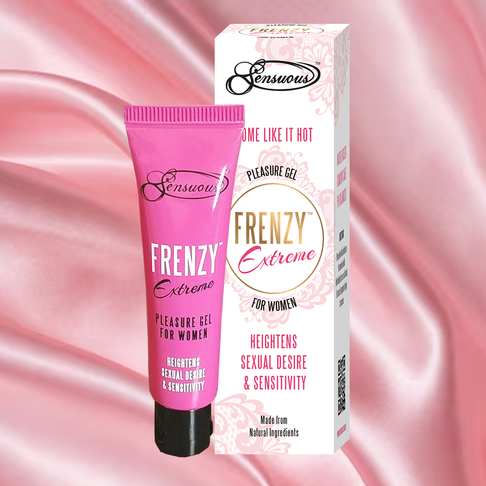THE SUPPRESSION OF FEMALE SEXUALITY BRANDS ... WHILE MALE PRODUCTS ENJOY A FREE PASS

In the dynamic media landscape, a concerning trend has emerged - the gendered censorship of female-focused sexuality brands, such as Frenzy Extreme by Sensuous, on large social media platforms.
While platforms like Meta (formerly Facebook), alongside other social media giants, may claim to promote inclusivity and diversity, there remains a noticeable disparity in their treatment of brands that cater to female sexuality compared to their male-oriented counterparts.
Our company Sensuous has no issues promoting its Edge Delay Gel for Men or Raging Bull Gel and Raging Bull Capsules on these sites.
But when it comes to our Frenzy Extreme (the female version of Edge Delay Gel) our ads are constantly declined - even though there is no nudity or sexual innuendo.

This gendered censorship not only hinders the growth of female-centric businesses but also perpetuates harmful cultural norms.
Gendered censorship inadvertently reinforces traditional gender stereotypes by favouring male-oriented content over female-focused brands.
This perpetuates the notion that male sexuality is more acceptable or marketable than female sexuality, contributing to an unequal and unhealthy representation of gender dynamics.
The censorship of female-focused sexuality brands can have profound effects on body image and self-esteem.
By marginalising content that empowers women to embrace their sexuality, some media platforms contribute to a culture that stigmatises and shames female sensuality, furthering the cycle of unrealistic beauty standards.
"Restricting the visibility of female-focused sexuality brands limits access to crucial sexual education resources," Keith Jones, CEO of Sensuous said.
"By suppressing content that provides comprehensive and inclusive information about female sexuality, some media platforms inadvertently hinder the development of a healthy and informed approach to sexual well-being."
Sensuous advocates for inclusivity. Individuals and organisations can also actively advocate for inclusivity and challenge gendered censorship by raising awareness on social media platforms.
Encourage open conversations about the importance of fair representation in media, and demand transparency from platforms regarding their content moderation policies.
Female-focused sexuality brands should collaborate and network with like-minded businesses and influencers to amplify their voices. By forming a united front.
Sensuous and these brands can challenge the norms that perpetuate gendered censorship and foster a supportive community that encourages inclusivity.
Below are two advertisements made for social media - the one on left, rejected, and the one of the right, accepted and published.
While major social media platforms may impose restrictions, there are alternative platforms that prioritise freedom of expression.
Brands can explore and utilise these platforms to reach a more diverse and accepting audience without the fear of unwarranted censorship.
Sensuous is regularly featured in magazines such as Maxim, Womens Health, XBIZ and Synergy just to name a few.
It is essential to continue educating the public on the importance of destigmatising female sexuality.
By fostering an environment that empowers individuals to embrace their sexuality without judgment, we can collectively work towards dismantling the cultural barriers that contribute to gendered censorship.
Gendered censorship in media and on platforms like Meta poses a significant challenge to the fair representation of female-focused sexuality brands.
Recognising the cultural effects of such censorship is crucial for understanding its broader impact on society.
In the world of intimate wellness, Sensuous has become a prominent brand offering a range of products designed to enhance personal experiences.
Interestingly, while these products are readily available on the shelves of major supermarkets such as Coles, Woolworths, and Chemist Warehouse, a paradoxical question arises - why are they not actively promoted to the masses?
Walk down the aisles of your local Coles or Woolworths, and you might stumble upon Sensuous products neatly displayed alongside other personal care items.
From lubricants to personal gels, our brand offers an array of products catering to various preferences.
The decision to make these products available in supermarkets suggests a growing acceptance of intimate wellness in mainstream retail spaces.
However, the limited promotion on social media of these products raises intriguing questions about societal attitudes and marketing strategies.

Sensuous products occupying the shelves of Coles, Woolworths, and Chemist Warehouse present a fascinating intersection of mainstream retail and intimate wellness.
While the products are easily accessible, the restrained promotion prompts us to reflect on the complexities of societal attitudes, marketing strategies, and regulatory considerations.
As conversations around intimate wellness continue to progress, the marketing landscape is poised for transformation, potentially paving the way for a more open and inclusive approach to promoting products that contribute to personal well-being.
Lauren Mills is a senior marketing executive with Sensuous.










